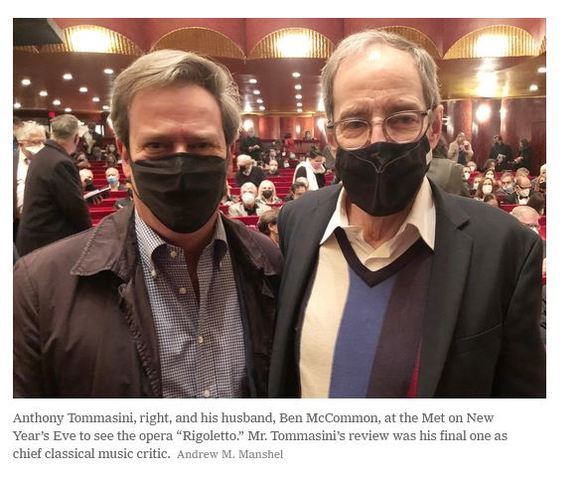As he retires after 21 years as the chief classical music critic, Anthony Tommasini reflects on his very first article for The Times: a deeply personal essay about a friend.

By Anthony Tommasini
Jan. 4, 2022, 5:00 a.m. ET
Times Insider explains who we are and what we do, and delivers behind-the-scenes insights into how our journalism comes together.
My first byline for The New York Times, which ran in early February 1988, was an opinion piece that I wish I’d never had to write. Yet, as I retire after 21 years as the chief classical music critic at The Times, I see how much that column prefigured my subsequent career.
At the time, I was a freelance classical music critic for The Boston Globe. A close friend from my class at Yale, Bob Walden, was declining fast from AIDS, and I went to visit him in New York. I’d brought some chicken salad for lunch, though Bob, having shriveled to about 100 pounds, hardly ate. He died on Jan. 1, 1988, at 39.
Despite my sadness, maybe because of it, I needed to write about Bob. During this early, brutal period of AIDS, many were writing about the death of their gay friends. But music, specifically Mozart, would be a unifying thread of my article.
Bob and I first met the day we arrived on campus in 1966. Though super smart, Bob crashed out by the end of freshman year, having been terribly unfocused and secretly miserable. He enlisted in the Marines and served two years before returning to Yale to finish his degree. But he struggled with being gay and, an even tougher battle, alcoholism. Bob never achieved sustained career success. Yet, he found purpose in ways that mattered: He was a fearless activist in a gay veterans group; a stalwart member of his Alcoholics Anonymous chapter; and the organizer of “Sundays at 4,” a group that met at St. Michael’s Church on the Upper West Side for parishioners dealing with sexual orientation issues or coping with H.I.V.
Bob had always liked classical music, but used to think that Mozart was above him, too refined or complex, which baffled me. He had a nice baritone voice, had sung in his prep school chorus, and at Yale joined an all-male singing group. What did he imagine he was missing in Mozart?
But as we ate lunch on that fall day in 1987, a tape Bob had made started playing Mozart’s consoling choral motet “Ave verum corpus.” As if chastising his own musical cluelessness, he said, “It’s so damn simple.”
That’s what I wrote about: Bob’s epiphany about Mozart seemed linked to insights he was making about life, as he approached death. I sent the column to The Times’s Opinion page, and it was accepted immediately. That led to realizations that shaped my career, my approach to music criticism and my life.
For one, I thought, “Well, I guess I’m a writer.” I meant, not just a pianist who had taken up music criticism, but someone who can tell people’s stories. Indeed, my second piece for The Times, which ran in September 1988, was a well-received interview with Vladimir Horowitz. From then on, I kept writing profiles and interviews after joining The Times. And I learned that you can tell people’s stories by describing the music they create.
During that last afternoon together, Bob asked me if I was H.I.V. positive. He had asked before but, now foggy, had forgotten. I assured him I was fine; I’ve never forgotten his reply. “Good,” he said, “someone has to stay to tell the story.” He was not talking about his own — he was talking about the AIDS crisis.
That’s what I did, starting with the column about him. I immersed myself in the crisis by volunteering on the hotline at the AIDS Action Committee in Boston, where I met the man who is now my husband. I wrote a long article for The Boston Globe Magazine about going through the final stages of life with a good friend who had worked there, and another about my experiences on the hotline, trying to advise panicked callers.
Then there was Bob’s touching breakthrough about Mozart, which I tried to account for in that column. I’ve always believed that people who love music, even if they lack any training, are more perceptive of the nuances and complexities of a piece than they realize. I direct my Times criticism to these instinctive perceptions. If a review I write is successful, a reader may feel, “Yes! That’s what I heard.”
At Bob’s memorial at St. Michael’s, the organist played “Ave verum corpus,” a request Bob had made. That’s when I started to cry. As Bob learned, and taught me, sometimes things really are as simple as they seem.
https://www.nytimes.com/2022/01/04/insi ... asini.html